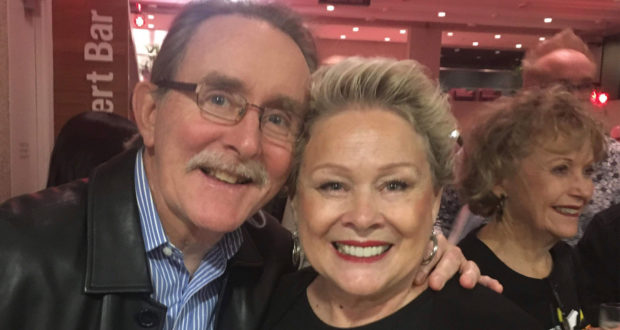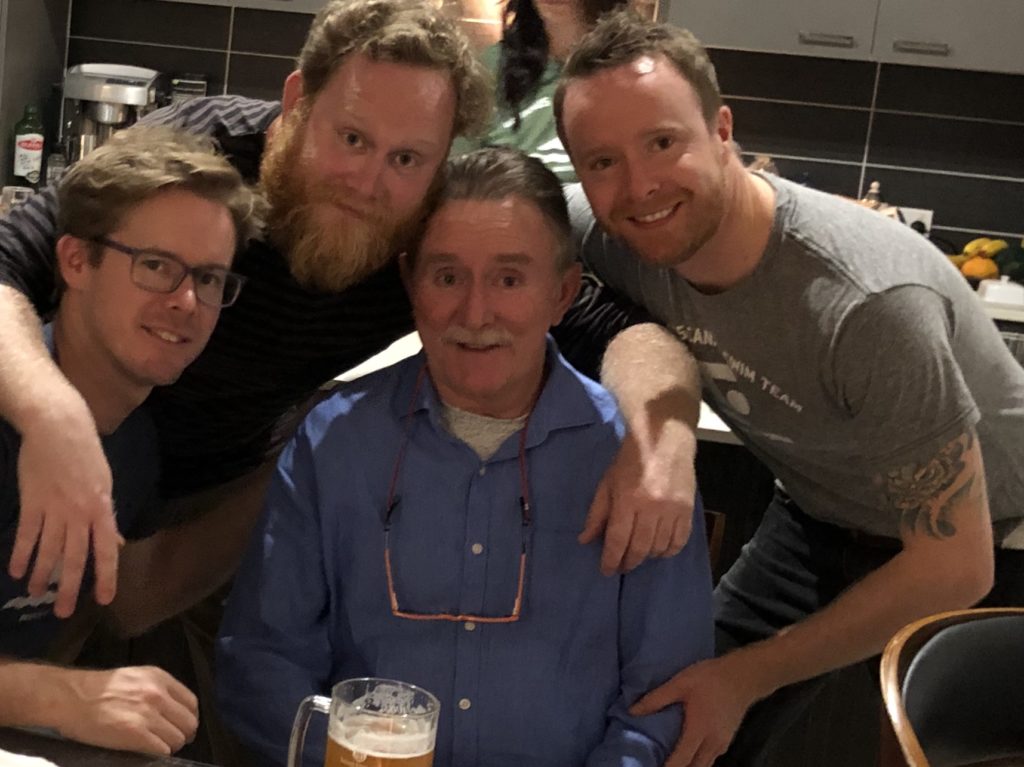A decade after her husband was diagnosed with early-onset dementia, Heather Fitzpatrick says she has learned to enjoy her time.
“I guess lots of people's pipe dream is to live the moment, but that's what I do,” she says.
“For me, it's singing, and I've pursued it even more ardently in the last couple of years than I had before.
"He always did love music and we've both always been involved in music, and that's still a big part of our enjoyment.”
Heather has been married to her husband Noel for 46 years and they have three adult sons and four grandchildren.
Diagnosed at 61, Noel had lived with Heather in their Brisbane home until he moved into residential care earlier this year.
Not a moment goes by where her husband isn't in her thoughts, Heather says.
“I look at the care facility as if we're in tandem, that they're looking after him while I can't.
“It's been the right decision, it's just a very hard decision to make.
“Nobody ever really knows how hard it is until you have to do it.”
Heather first met Noel when she was 19, and the pair moved to Queensland after he accepted a job running the marketing side for Kerry Packer’s once-great magazine empire.
During his life, Noel has cycled across France, run a marathon, played touch football, and habitually woke up at dawn each morning to go riding.
Heather described her husband as "the most physically fit, sparky guy you could ever want to meet".
“Dementia, in particular, and Alzheimer's is not in the family,” she said.
“He, as the specialist said, had lived his life like they ask everybody to do.”
For Heather, the initial early signs in her husband appeared in "small, funny ways".
When out with friends, Noel would become stuck on a sentence and began to have reoccurring nights of restless sleep.
"It probably was happening at about the time he was about to retire, and I just put it down to exhaustion,” said Heather.
“I wouldn't say he did anything really alarming, he was just not himself.”
One night, Heather returned home to find Noel in an unusually flustered state. He was convinced that he had done something drastically wrong with their online banking account.
After looking at the computer, she realised that he had swapped some money between their accounts.
The minor mistake continued to bother Noel for the rest of the evening, to Heather's concern.
“That sort of symptom was something that would recur in the next few weeks,” she said.
“Something else would go wrong and we would rectify it and sort it, and he couldn't let it go.”
After visiting a psychiatrist, Noel underwent a series of tests which later confirmed he had evidence of frontotemporal dementia. It showed up in swiss-cheese like digital watermarks on the digital scan.
Heather said she was home with her sons the evening that she received the news.
“I guess it's like being told you've got cancer,” she said.
“The first couple of days were pretty traumatic, but the way we work is we find a way to get through this, and my sons were the first to say how they were going to get me through this.
“They’ve been my rock.”
As Noel’s dementia progressed, Heather monitored and managed his medications, helped him complete daily tasks and organised his weekly appointments.
After waiting for two years for the first home care package, Noel was reassessed at a high-needs level and later suffered a heart attack.
Heather said she began to hit a breaking point when she could not leave him alone for more than five minutes.
“I was always told, ‘you're still on the list', and in that meantime I needed help,” she said.
“I rang on a regular basis to My Aged Care to find out how far off [we were]. After we'd waited nine months I started maybe phoning once a month.
“There was no consistency, as in a caseworker that would look after me.”
Many older Australians rely on unpaid family caregivers, with an estimated 1.1 million people providing informal support to loved ones according to the ABS.
Access to timely home care support is a widespread issue for carers and their families and was highlighted during the royal commission.
As of March, around 15,524 people were waiting in the national queue for home care approval.
For Heather, receiving the home care package in time would have allowed her one more year to have her husband at home.
“It's just very hard to explain why it's so hard as a carer, but you never ever have a time when you're just yourself again.
“You're always thinking for two people from the moment your eyes open to the moment you go to sleep.”
As of this year, Noel has lost his speech capacity and is unable to read or write. He still recognises his family.
Heather has moved house to be closer to her children, and spends time gardening and singing to cope with stress.
She has also become an advocate for Dementia Australia to raise awareness to the general public.
"Because someone's got dementia, it doesn't mean that they're not capable of enjoying themselves and enjoying the community and being part of the community," she said.
"There may be times where they're not as communicative or physically able to do as much, but there will be lots of things that they could partake of."
A few years ago, Heather began travelling with a friend to sing around different retirement homes, including her husband's.
When the nurses remind Noel that his wife will visit to sing that day, he’ll go into the room where they are due to perform and wait in the front row.
“Nobody can move him,” she said.
“The other time he got up when he heard something that I used to sing, because he used to play beautiful guitar.
“I think it was something that I used to sing with him and he just... the light went on and he just got up and came over to me and danced with me while I was singing, which was really bittersweet.”
This year’s theme of 2021 Dementia Action Week, ‘A little support makes a big difference’, pays tribute to the loved ones and family carers of people living with dementia.
For more information visit: https://www.dementia.org.au/dementia-action-week
Do you have an idea for a story?Email [email protected]
 Aged Care Insite Australia's number one aged care news source
Aged Care Insite Australia's number one aged care news source




What a great story,so realistic to the disease and living with it. Like so many others the wife cared for her husband until exhaustion made it impossible.
That unfortunately is a very common mistake we see so often,instead of looking after the whole family and being able to enjoy whatever time together you have many families fall apart in the process.
Entering residential care is liberating for the family, they still love and care but they are able to enjoy the visits . They don’t love each other less but they can have a minute off stress free.
Thank you for sharing your story Heather, Noel and family. No doubt many who read it will be inspired by your courage and transparency to accept the things they can change – have the serenity to accept the things they cannot and gain the Wisdom to know the difference so family and friends can the fullest life possible with Dementia.